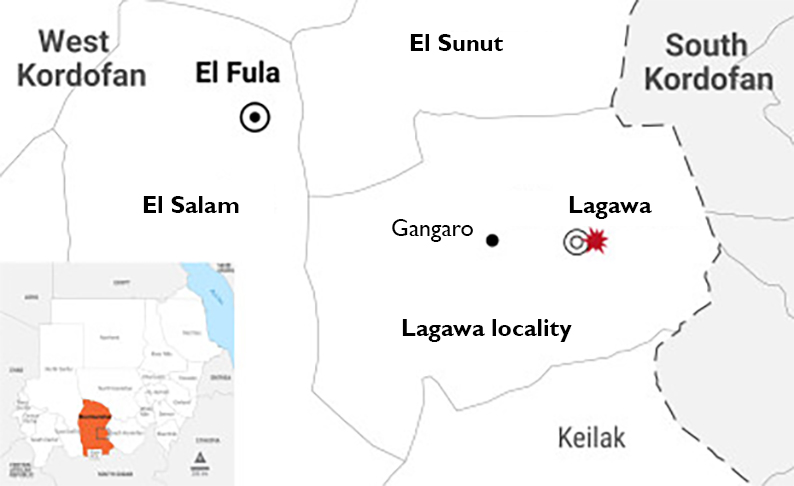West Kordofan ‘still tense’ following inter-tribal clashes
The Wali (governor) of West Kordofan has confirmed that skirmishes continue in the state’s Lagawa locality, after tension between the Misseriya and Nuba tribes escalated following a dispute over land ownership on 10 October. The United Nations Office for Humanitarian Affairs (OCHA) laments that the area is still inaccessible to humanitarian responders due to ongoing unrest.
 Map showing conflict area in Lagawa locality, West Kordofan (OCHA)
Map showing conflict area in Lagawa locality, West Kordofan (OCHA)
The Wali (governor) of West Kordofan has confirmed that skirmishes continue in Lagawa after tension between the Misseriya and Nuba tribes escalated following a dispute over land ownership on 10 October. The United Nations Office for Humanitarian Affairs (OCHA) laments that the area is still inaccessible to humanitarian responders due to ongoing unrest.
The hostilities began after a dispute at Gangaro village, approximately three kilometres east of Lagawa town. On 13 October, the Misseriya tribesmen claimed the land, which led to an exchange of gunfire between the Misseriya and Nuba in the market in Lagawa itself, which continued through 14 and 15 October.
Khaled Jeili, the acting governor of West Kordofan, confirmed that the situation in Lagawa area is “still tense and unsafe”.
In an interview with Radio Dabanga, the governor said that he visited Lagawa on Monday and appealed to the parties “to sit down and resort to the voice of reason and return to dialogue to address issues instead of the tension and incitement between them”.
He confirmed that there has been a large exodus from the town, and that the displaced people are living in poor conditions without shelter or aid. He called on humanitarian organisations and the government to urgently intervene to shelter the displaced, return them to their homes, and provide them with protection.
The governor added that the state’s security committee met on Tuesday morning to discuss the situation.
The Nuba Bar Association called on the UN Integrated Transition Assistance Mission in Sudan (UNITAMS) to send observers from the UN to assess the situation and take the necessary measures to protect civilians in Lagawa.
The area of Lagawa is part of the Nuba Mountains, and used to be part of the Southern Kordofan Province. West Kordofan has importance in terms of natural resources including animals, rain-fed agriculture, and oil fields. Communities in the area still suffer from the lack of basic social services such as health, education and clean water.The area of Lagawa is part of the Nuba Mountains, and used to be part of the Southern Kordofan Province. West Kordofan has importance in terms of natural resources including animals, rain-fed agriculture, and oil fields. Communities in the area still suffer from the lack of basic social services such as health, education and clean water.
Humanitarian response
In a flash update released today, OCHA in Sudan confirmed that at least 4,000 people (about 800 families) were reportedly displaced and many homes in the town were burned and looted. There are reports of 12 people killed and 20 wounded as of 16 October, according to the International Organisation for Migration Displacement Tracking Matrix (IOM DTM).
A number of displaced people have taken refuge in the Lagawa army garrison, a school, and the police station. In addition, others reportedly sought refuge in neighbouring Delling in South Kordofan.
Despite yesterday’s visit to the area by the West Kordofan governor, who was accompanied by members of the state security committee, the town was reportedly shelled at around 18:00 by missiles coming from nearby mountains. No information on casualties has been received yet, the OCHA update says.
OCHA laments that the area is currently inaccessible to humanitarian responders, however the Sudan government’s Humanitarian Aid Commission (HAC) and partners are discussing a humanitarian mission to the affected area.











 and then
and then